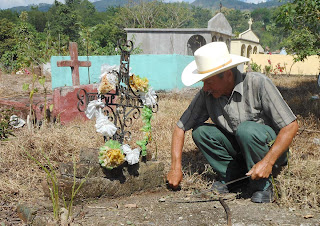This is the first time
I've lived anywhere other than Canada, let alone in a country with such a
ferocious reputation for violence that my friends and family are regularly
checking in with concerned voices as to whether everything’s fine down
here.
Nothing to worry about,
I tell them. And I mean that. Despite the endlessly bleak news about Honduras
and a truly formidable murder rate, this country has in fact been a very
pleasant place to live these past 10 months. The place needs work, absolutely,
but this seemingly global need to portray the country as a random killing zone
is both cruelly inaccurate and damaging to the people who live here.
A worried friend back
home recently asked me about this comment from the latest newsletter of Médecins
Sans Frontières/Doctors Without Borders. In Honduras, “violence is the main
strategy for solving any problem, whether it’s related to drugs or not,” said
MSF spokesman Javier Rio Navarro.
I don't know about
you, but that kind of statement conjures in my mind visions of dangerous men
everywhere, daggers clenched between their teeth and assault rifles at the
ready should there be a need to gun down random strangers. It conjures up a country
that is inherently violent, where the norms of civilized society have broken
down and no one is safe anymore.
I have tried to square
that image of Honduras with my daily experiences here, in which I walk back and
forth to work and meet nothing but friendly people also walking to wherever
their day-to-day routine is taking them in the moment: To the market to sell
tortillas; to their child's school; to the field where they're moving the cows;
to their construction job. It doesn't square.
I've even walked the
wild streets of Tegucigalpa. And while the city has yet to win me over, nobody my
partner and I have come across in our visits there has been looking to do two
gringos harm.
Nor were they shooting
at each other, having fights, robbing passing strangers, or otherwise wreaking
havoc on the social order. They were going about their business. That’s what
human beings tend to do most wherever they are in the world, even in the middle
of a full-on war.
I've yet to see a
problem solved with hand-wringing. But that and a challenging reform of
the Honduras police force – badly needed, but not a solution all on its own - are pretty much all that’s going on. As far
as I can tell, no work is underway to get underneath the scary statistics and
figure out who is really at risk and what can be done about it. Simply piling on
more headlines to scare off even more of the tourists certainly isn’t any help.
Here’s my take on who’s
really at risk here, based on my reading of the news and the many stories I’ve
heard from Hondurans:
- Anyone associated with the illegal drug industry, where assassination is used to kill off the competition, wreak vengeance, and “send a message” through the murder of family members, loved ones and acquaintances of a narco-traficante on the wrong side of somebody’s list.
- Poor people who live in the poorest barrios and ride the cheapest buses, which are regularly held up by robbers and gang members who either want to steal what they can in the moment or extort the driver and passengers with a “war tax.”
- Poor business owners who are extorted by gangs just for trying to make a living in the roughest areas of the big cities where law and order simply don’t exist.
- Campesinos fighting in the heated Bajo Aguan land dispute.
- Hondurans engaged in Hatfield-and-McCoy style vendettas over real and perceived wrongs of the past, in which one violent act begets another and another for potentially years.
- People who get fingered by acquaintances as a known killer, robber or otherwise bad person, and thus become candidates for the kind of street justice that can happen in a country with a troubled police history and a largely ineffective justice system.
- The unfortunate innocents who occasionally find themselves in the wrong place at the wrong time when one of the above-mentioned groups engages in violence and kills them by accident.
That’s a lot of people, for sure.
But except for the last category, it’s not a random collection. It still means
Honduras has some big problems to get a handle on, but it doesn’t mean that the
whole country is a dangerous wasteland that only dare devils and the uninformed
would ever spend time in.
That image does such a disservice to
the vast majority of pleasant, peaceful, deeply religious Hondurans. It does
the country genuine harm by scaring off the aid programs, investors and travellers
that are so vital to a brighter future for Honduras.
Don’t believe everything you read.
Good people live here, and they need more from the world than condemnation and
fear-mongering.

.jpg)






.jpg)